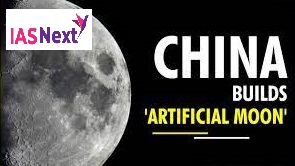CURRENT AFFAIRS
Get the most updated and recent current affair content on Padhaikaro.com
China’s artificial moon
- IAS NEXT, Lucknow
- 21, Jan 2022

Reference News:-
China has built an artificial moon research facility that is capable of lowering the gravity level using magnetism.
- The research facility is scheduled to officially launch later this year.
- This research facility is also said to be the first of its kind in the world.
Objective of the project:
The idea is to make gravity “disappear” by using powerful magnetic fields inside a 60cm vacuum chamber.
About the mini moon:
- The mini-moon is about two feet in diameter and the artificial surface has been made with rocks and dust.
- The facility is located in the eastern city of Xuzhou, in Jiangsu province.
Uses, applications and benefits of this facility:
- China plans to use this research facility to test out instruments and technology in a low-gravity environment similar to that of the moon, and see whether its experiments can be successful on the lunar surface.
- The research facility is also expected to help in determining the possibility of human settlement on the moon.
Magnetic levitation:
The idea to develop artificial moon facility has its roots in the Russian-born physicist Andre Geim’s experiments to levitate a frog with a magnet. The physicists later won a Nobel for this groundbreaking experiment.
Magnetic levitation is certainly not the same as antigravity, but there is a variety of situations where mimicking microgravity by magnetic fields could be invaluable to expect the unexpected in space research.
The principle behind this:
Atoms are made up of atomic nuclei and tiny electrons that orbit them in little loops of current; these moving currents, in turn, induce tiny magnetic fields.
- Usually, the randomly oriented magnetic fields of all the atoms in an object, whether they belong to a drop of water or a frog, cancel out, and no material-wide magnetism manifests.
- Apply an external magnetic field to those atoms, however, and everything changes: The electrons will modify their motion, producing their own magnetic field to oppose the applied field.
- If the external magnet is strong enough, the magnetic force of repulsion between it and the field of the atoms will grow powerful enough to overcome gravity and levitate the object — whether it’s an advanced piece of lunar tech or a confused amphibian — into the air.